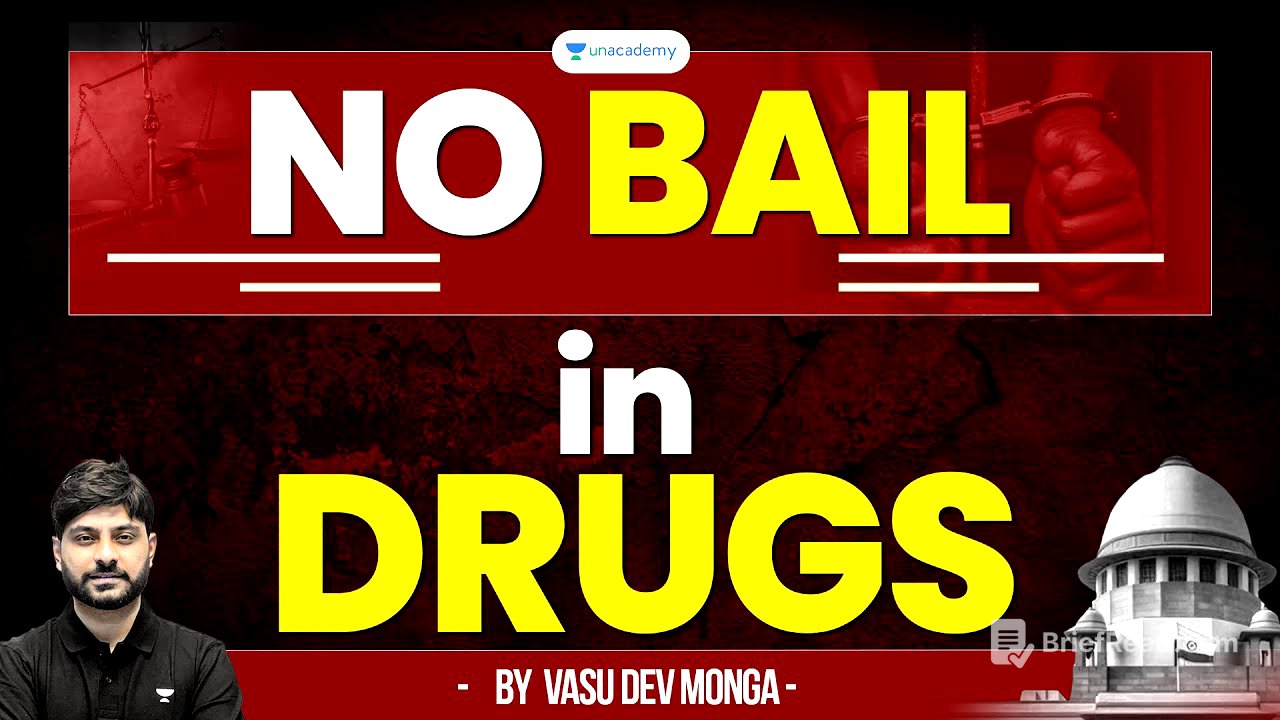TLDR;
This video discusses the Supreme Court's ruling on anticipatory bail in NDPS (Narcotic Drugs and Psychotropic Substances Act) cases, specifically referencing the case of Dinesh Chandra versus State of Haryana. It explains that anticipatory bail is generally not granted in cases involving more than 5 grams of drugs. The video further clarifies the possibility of applying for regular bail after arrest, though its approval is not guaranteed and depends on the merits of the case. Additionally, it touches upon the presenter's experience with NDPS cases, the severity of drug-related offenses, and an opportunity for a judiciary scholarship test by Unacademy.
- Anticipatory bail is typically denied in NDPS cases involving more than 5 grams of drugs.
- Regular bail can be applied for after arrest, but its approval depends on the case's merits.
- The Supreme Court's strict stance aims to deter drug trade by making it difficult for offenders to get bail.
Introduction to NDPS Act and Bail [0:03]
The video introduces the Narcotic Drugs and Psychotropic Substances Act (NDPS Act), which governs drug-related offenses in India. It explains that possessing more than 5 grams of drugs makes it difficult to obtain bail. However, possessing less than 5 grams of substances like opium or cocaine may allow a person to get bail. The presenter notes that the legal grounds for bail become significantly limited when dealing with larger quantities of drugs.
Supreme Court Ruling: Dinesh Chandra vs. State of Haryana [1:04]
The Supreme Court's ruling in Dinesh Chandra versus State of Haryana clarifies that anticipatory bail is not granted in NDPS cases under any circumstances. The case originated from the Punjab and Haryana High Court, involving a person found with 1 kg of "post" (a type of intoxicant) and 900 grams of cocaine. The combined value of these drugs was estimated to be in crores of rupees. The Supreme Court upheld the decision of the Punjab and Haryana High Court, reinforcing that anticipatory bail is not applicable when more than 5 grams of drugs are involved.
Anticipatory Bail vs. Regular Bail [2:32]
Anticipatory bail is defined as bail obtained before custody, based on the apprehension of arrest for a non-bailable offense. Once a person is arrested, they cannot apply for anticipatory bail. However, the video clarifies that even though anticipatory bail is not an option in NDPS cases involving significant quantities of drugs, an arrested person can still apply for regular bail. The decision to grant regular bail is based on the merits of the case, but the presenter notes that it is often difficult to obtain in cases involving large quantities of drugs.
Lawyer's Experience and the Severity of NDPS Cases [4:36]
Drawing from personal experience as a lawyer, the presenter shares that obtaining bail is still possible for possession of drugs ranging from 5 to 15 grams. However, when the quantity increases significantly, such as in cases involving 1 kg or more of drugs worth crores of rupees, even regular bail is rarely granted. The presenter emphasizes the Supreme Court's stance against granting anticipatory bail in NDPS cases, advising individuals to surrender to the court or police and then apply for regular bail.
Importance of Strict Laws and Unacademy Judiciary Scholarship Test [5:50]
The presenter underscores the importance of strict laws to deter drug usage and trade. The difficulty in obtaining bail is intended to keep offenders behind bars, thereby reducing the drug business. The presenter encourages viewers to share this information to deter others from engaging in drug-related activities. The video also introduces the Unacademy Judiciary scholarship test, offering opportunities for aspiring legal professionals to gain scholarships and access comprehensive study materials. The scholarship test is scheduled for July 14th at 5:00 PM, and participants can use the code VDM to get a discount and apply for the test for free.
Unacademy Features and New Criminal Law Batch [7:57]
The video highlights features of Unacademy's Judiciary Iconic Pro program, including mentorship, doubt-solving classes, and career guidance via video or audio calls. The presenter announces a new batch starting on July 15th, focusing on the Indian Civil Defence Code and other new criminal laws. The batch includes multiple educators who will provide comprehensive judiciary training. Viewers can enroll using the code VDM. Additionally, test series for various state judiciary exams are available for a nominal fee of ₹1.









